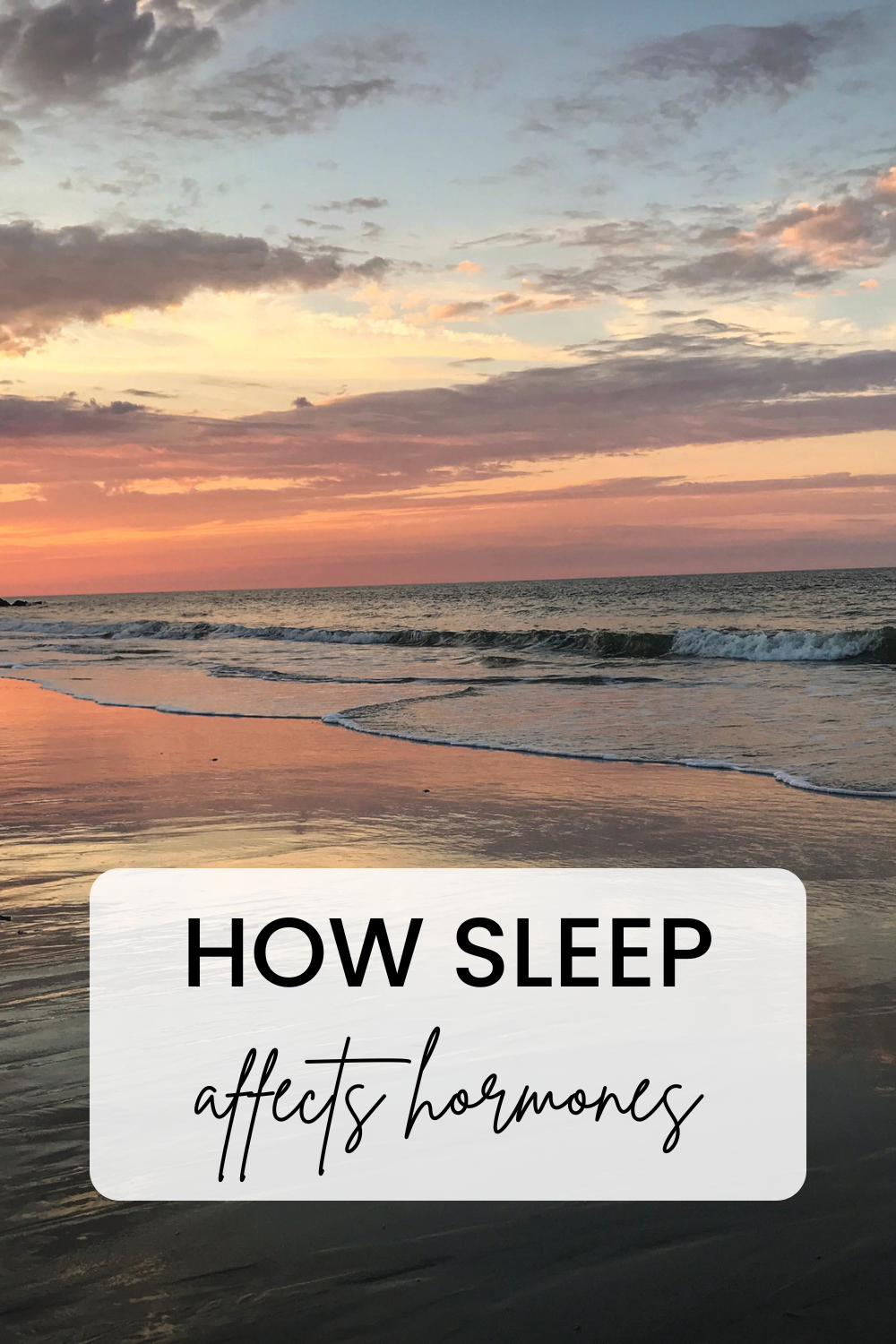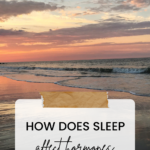Getting better sleep can help balance hormones, regulate the body's natural function, and improve every aspect of your life.

Jump To
I know, it's a bold statement to make but hear me out. Sleep affects every area of our life. Again, I'll repeat - every area of our life. We've all heard the saying, "I'll sleep when I'm dead. But it's safe to say that the very endpoint may come sooner than expected if we continue skimping on sleep. We put a price on being able to get more done and sleep less. We work longer hours, are able to stay on our laptops and phones until the wee hours of the morning, watch Netflix like it's our job, and check Instagram just.one.more.time right before we close our eyes. It's an epidemic.
I marvel at people who say they need 8-9 hours of sleep. I have two children (ages 6 and 3) and I last time I had consistent sleep was circa 2012. Now don't get me wrong, I wouldn't want it any other way, and I love my children beyond words, but sleep deprivation has affected me. Exactly what has it affected? Let's see...my mood, my hormones, my lifestyle, my ability to focus, my patience level, my ability to handle stress, my ability to relax, my hunger, my energy levels...you get the idea.
There are pills you can take for losing weight, pills you can take for headaches, pills for pretty much anything and everything but there is no pill to replace lost sleep. Sure you can drink some caffeine but you will never be able to attain the level of health and vitality you would just by getting enough sleep.
How Does Sleep Impact Weight?
I'll start by going down memory lane and recalling college parties, staying up until all hours, and waking up hung over and exhausted. Naturally, I didn't gravitate towards the breakfast I eat now, I generally went for whatever garbage was available in the dorm room or straight for Denny's breakfast with my friends. Generally, anything that was high fat, high carb, and loaded with sugar.
Sleep deprivation affects the endocannabinoid (eCB) system, which is a key player in controlling the brain's appetite and energy levels. " If you see junk food and you've had enough sleep, you may be able to control some aspects of your natural response. “But if you're sleep deprived, your hedonic drive for certain foods gets stronger, and your ability to resist them may be impaired. So you are more likely to eat it. Do that again and again, and you pack on the pounds.”"
I'm certain that all of you would probably validate the fact that after a night of sleep deprivation, you're hungrier and less likely to make wise decisions when it comes to what you're putting in your mouth. Additionally, when you're sleep deprived, the stress hormone cortisol increases, which in turn increases your appetite. Sleep deprivation leads to high cortisol which leads to overeating.
How Does Sleep Alter Mood?
Just ask my husband what I'm like after a sleep-deprived night. I'm sure many of you can relate. Not getting the proper amount of sleep affects the regulatory function of the brain. We are unable to focus and properly digest information. "The ability of the brain to tell what's important is compromised. It's as if suddenly everything is important." A breakdown over spilling coffee comes to mind. This may play a particular role for people suffering from anxiety, depression, and PTSD as they're much more likely to be affected by lack of sleep.
How Does Sleep Affect Hormones?
There are two systems that control hormones that are affected by sleep. One is the hypothalamic-pituitary-adrenal axis and the other is the autonomic nervous system. The pituitary gland is known as the master organ of hormone release. It's responsible for:
- "Adrenocorticotropic hormone (ACTH): ACTH stimulates the adrenal glands to produce hormones.
- Follicle-stimulating hormone (FSH): FSH works with LH to ensure normal functioning of the ovaries and testes.
- Growth hormone (GH): GH is essential in the early years to maintain healthy body composition and for growth in children. In adults, it aids healthy bone and muscle mass and affects fat distribution.
- Luteinizing hormone (LH): LH works with FSH to ensure normal functioning of the ovaries and testes.
- Prolactin: Prolactin stimulates breast milk production.
- Thyroid-stimulating hormone (TSH): TSH stimulates the thyroid gland to produce hormones.
Anti-diuretic hormone (ADH): This hormone prompts the kidneys to increase water absorption in the blood.
- Oxytocin: Oxytocin is involved in a variety of processes, such as contracting the uterus during childbirth and stimulating breast milk production".
The autonomic nervous system is controlled by the hypothalamus and is responsible for all the unconscious functions in our body, such as sleep, breathing, digestion, pupil dilation, arousal, urination etc. It also has two subdivisions. The sympathetic nervous system and the parasympathetic nervous system. When we sleep, the sympathetic nervous system slows down (which is responsible for "flight or fight"), and our parasympathetic nervous system is activated. This allows the body to rest and recover, decreases blood pressure, regulates digestion, and more.
When we are sleep deprived the sympathetic nervous system does not have enough time to take care of its housekeeping and clean up the body. As you can see this leads to a slew of hormonal disturbances.
How Does Blue Light Affect Sleep?
The average person has a 24-hour circadian rhythm. Up until recently in our evolution as a species, we relied on the sun for light during the day. When the sun went down, it was a sign that everyone would start to wind down and prepare for sleep. But this is not the case today with many people working late into the night, or night shift, staying up watching TV, playing video games, on phones etc.
So what's wrong with this? "Study after study has linked working the night shift and exposure to light at night to several types of cancer (breast, prostate), diabetes, heart disease, and obesity. It's not exactly clear why nighttime light exposure seems to be so bad for us. But we do know that exposure to light suppresses the secretion of melatonin, a hormone that influences circadian rhythms, and there's some experimental evidence (it's very preliminary) that lower melatonin levels might explain the association with cancer"
The simplest way to understand the process of how melatonin affects sleep is this: When it's time for sleep, melatonin is produced and cortisol levels are suppressed. Once we are exposed to light in the middle of the night, this will signal the brain that it's time for cortisol to be released and melatonin to receede.
Now I don't think the alternative is that we all go out an buy melatonin by the case full but I think there are many things we can do to make some changes as sleep truly affects every single process in our body.
15 Ways To Improve Sleep Right Now
- Get f.lux on your laptop: Which you can download right here for free. It will adjust the lighting on your computer and tone down the blue light once the sun goes down. It will reverse the process once the sun comes up!
- Computer glasses: I bought mine here and you can certainly buy ones that are pricier and fancier but they do make a big difference in toning down blue light, mimicking natural dusk, and easing eye strain due to computer and phone use.
- Dim your phone at night: Most smartphones have an option for night shift and you can set the start and finish points for this. Mine is set from 8pm-8am.
- Turn off notifications: Every time you get a notification, your phone lights up. You may not see it but your brain certainly registers this even through your closed eyes.
- Make sure your room is pitch black: Please ensure that you and your kids don't have night lights on. I know from personal experience my son will not go to sleep without a night light, so the alternative is to have a battery-operated one that shuts off after a certain amount of time. Additionally ensuring that if you have to have a night light, that it is red or orange, and avoid yellow, white, blue, and green light. If you live in a city, get blackout curtains, shades, or an eye mask.
- Turn alarm clocks towards the wall and cover up any blue or green lights: You don't need to see the clock when you're sleeping and checking the time in the middle of the night, does nothing for our sleep.
- Get rid of TV in your bedroom: Based on all reasons I've previously mentioned, getting rid of TV in your bedroom is crucial. If you're used to falling asleep with a TV do whatever you can to try to scale back and eventually learn to sleep without it.
- Dim your lights in the evening: Replacing bright lights with dimmer bulbs or getting an actual dimmer switch can be beneficial in letting your body prepare for sleep and encouraging proper melatonin release.
- Get a sound machine: They're definitely not just for babies. Sound machines mask noises and provide an ambient sound allowing you to fall and stay asleep throughout the night. I personally can't sleep in absolute silence.
- Make sure you love your mattress: If your mattress is old and uncomfortable, it might be a good idea to invest in a new one! It doesn't have to be expensive but it has to be right for you. You can't put a price on proper sleep. Shop around and find something that works for you.
- Get new pillows: We all need to replace pillows on a regular basis. The recommendation is every 6 months for polyester pillows and 18-36 months for memory foam. Uncomfortable pillows will hinder a proper night's sleep.
- Wear comfortable clothing or no clothes at all: Science backs it up, temperature affects how we sleep so ensuring that we're not wearing anything too tight, might assist in keeping you asleep.
- Keep your room cool: Just as stated in #12, temperature can significantly affect sleep and sleep cycles so keeping a room cool will make a difference for adults but especially for children.
- Go to bed by 10pm: Most Americans do not get the recommended 7 hours of sleep so regardless of when you wake up, it's important to get to bed by 10. During the hours of 10pm-2am is when we get the most restorative sleep, when 80% of human growth hormone is released and most repair takes place in the body.
- Meditate before you go to sleep: It would be counterintuitive to offer any apps or guided meditation videos, though you can certainly use those if absolutely necessary. But simply paying attention to your breath for 5 minutes may do wonders for your mind and body, helping you ease into sleep.
Most of these steps can be implemented right now and if you have children who are struggling with sleep, they can certainly benefit as well!
The way we put a price on eating healthy and exercising and it's time that we put the same emphasis on sleep.






Gretchen Strader
What a great article. Thanks for sharing..
Daniela Modesto
It's absolutely my pleasure and I'm happy you liked it 🙂